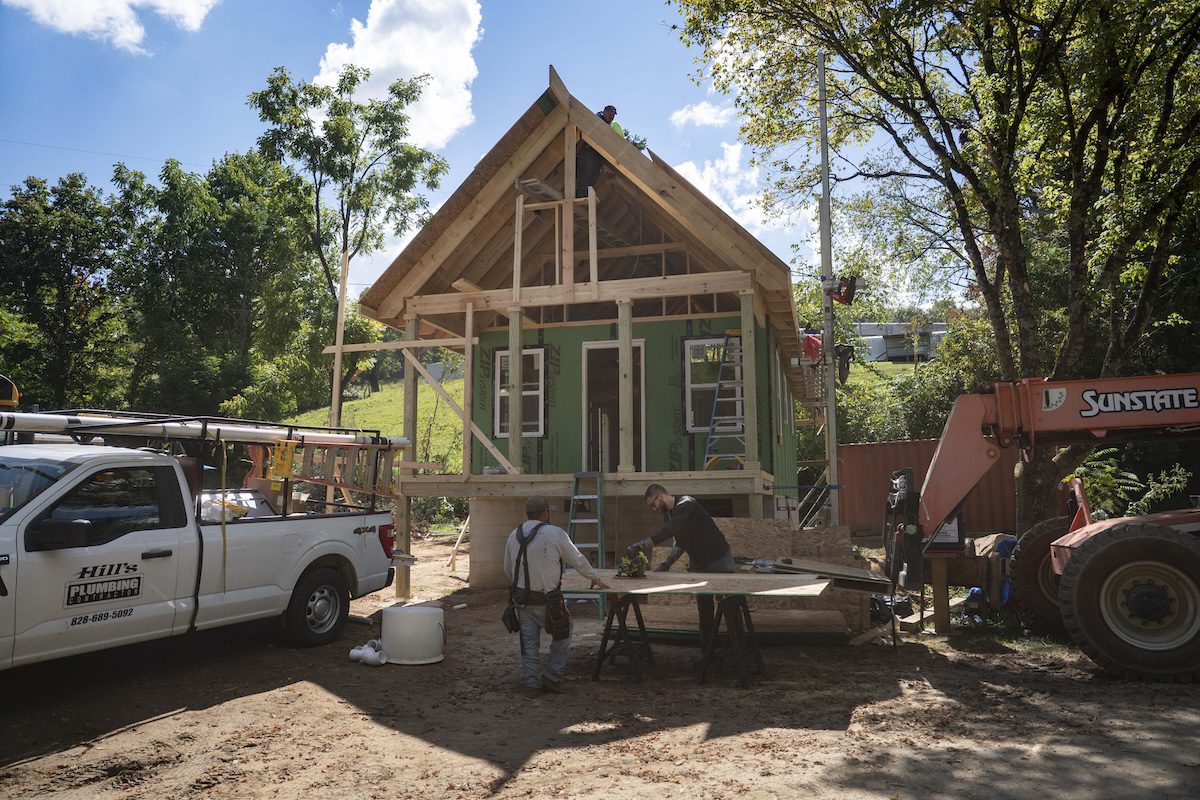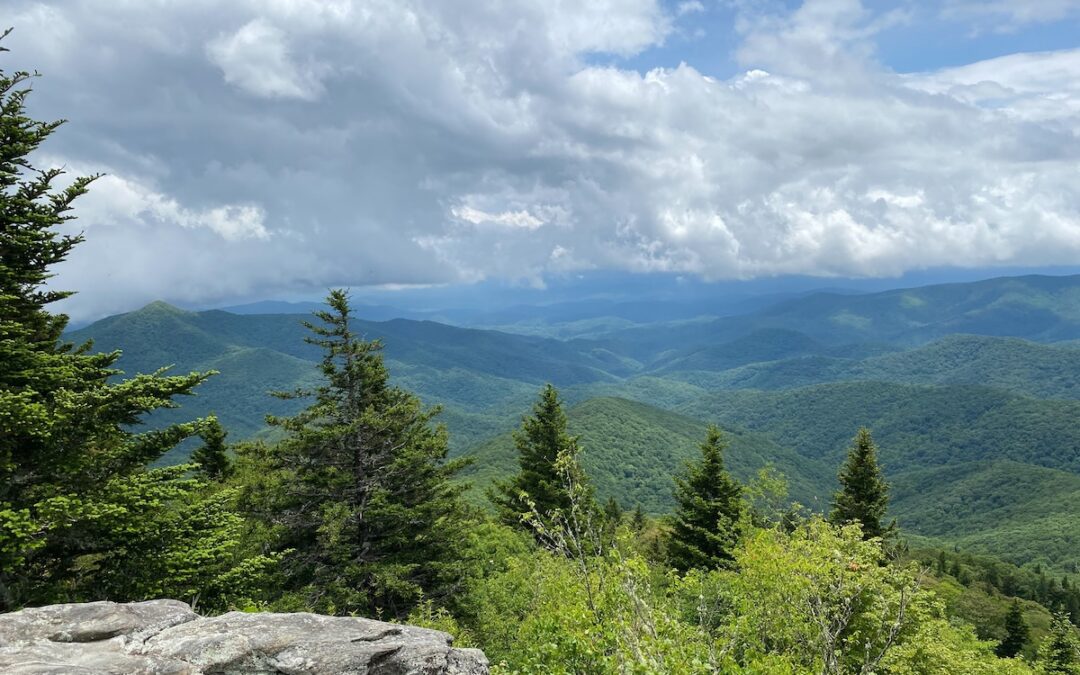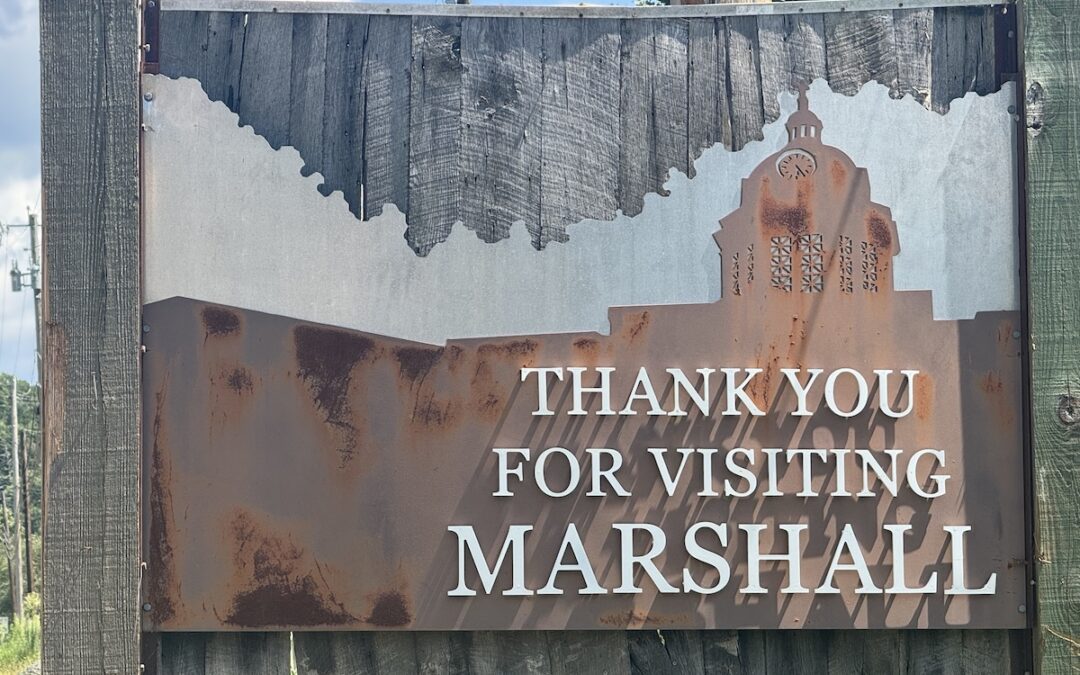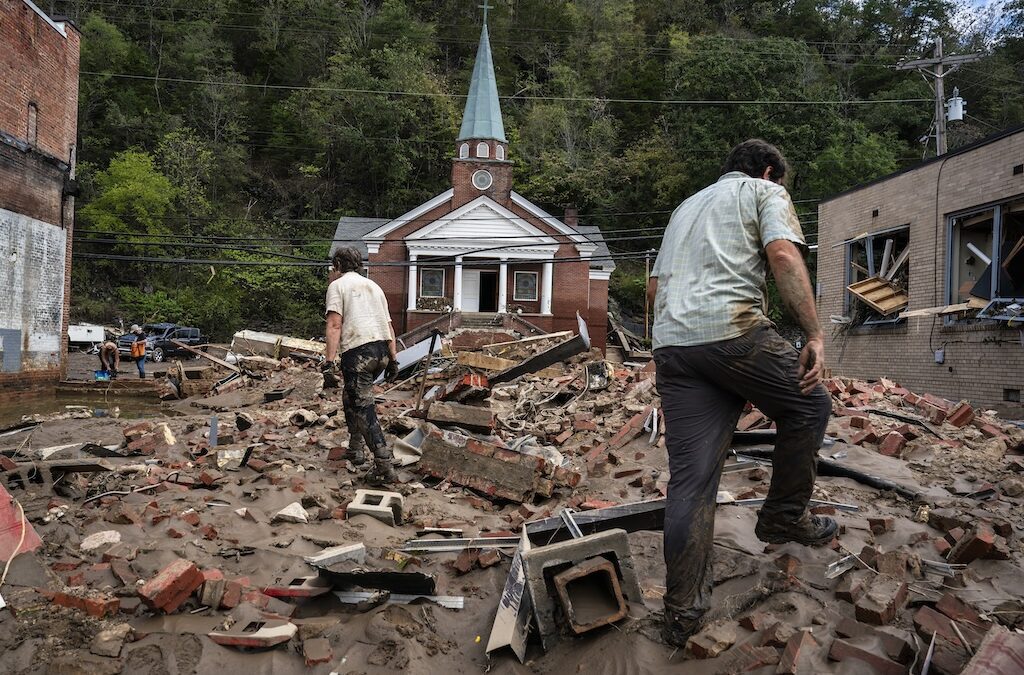
Allison Joyce/Getty Images
Hurricane Helene left at least 108 people dead, over 100,000 homes damaged or destroyed, and over $60 billion in total costs. A year later, communities across western NC are still picking up the pieces.
September 27, 2024.
It’s a day Black Mountain resident Logan Cole will never forget.
On that Friday morning, Hurricane Helene swept through western North Carolina, unleashing devastation across the region. The storm’s forceful winds sent rainwater into Cole’s home. The sound of picket fences being torn apart thundered all around him.
“Wind and rain are literally blowing through the downstairs bottom window to my back wall, all over my bed. I’m getting sprayed. And the pickets sounded like a ghost train,” he said in an interview.
Cole was lucky, though. His home was spared the worst. As soon as he was able to, he got in his truck and drove down the road to see if there were people who needed help.
“I made it about a quarter mile down my road, which is a single-lane private dirt road, came around a corner, and everything was gone. Piled pieces of houses everywhere,” Cole said.
A mudslide had devastated his neighbors’ homes, trapping several of them.
“My neighbor Pamela was out on her porch. Pamela confirmed that there were people up there screaming, and I just gave my cell phone back to my buddy Brooks and said, ‘take my truck back up the road, use my phone, use your phone, use every phone. Start calling 9-1-1. There’s people trapped up there,’” Cole recalled saying.
Cole jumped into action to help two of his neighbors, a father and daughter. Their house had been pushed downhill by a mudslide, crashed into a tree, and was cut in two. The father was stuck inside the home, but his daughter was thrown outside. When Cole got to her, she was covered in mud and debris.
“I found Kate buried, very much alive. Very fortunately not terribly injured,” he said.
Once he rescued her, Cole worked with other neighbors for the next hour and a half to get her father out from under the wreckage of what was once their kitchen.
“He was buried underneath his appliances, his cabinets, the kitchen sink he had cooked dinner at for the last, I think 32 years, was laying on top of him,” Cole said.
Both father and daughter survived, receiving medical treatment once first responders arrived on scene. Cole praised the work of first responders and the Broad River Fire Department.
“They did an amazing job,” he said. “They really worked very, very hard to get them out.”
Neighbors helping neighbors
In the immediate aftermath of Helene, people all across the region came together to help survivors.
John Garcia and his wife, Anna, first opened Lookout Brewing in Black Mountain in 2013. The business became a community staple, with familiar faces tending the bar.
“Most of our bartenders have been here five plus years,” Garcia said. “It’s a little different than what you might find in a big brewery where there’s not a whole lot of names that you know.”
Garcia’s brewery was spared the worst of Helene, though it was without power and water.
“One block that way is total underwater devastation, and we were just fine,” he said.
Because his brewery was left relatively unharmed, and because it was already a centerpiece of the community, it quickly became a meeting point for survivors on day one.
“We had 600 gallons of water in one of the tanks, so I handed out some beer and handed out some water to some of our friends that had just shown up,” Garcia said.
They all agreed to return the next day, and one of his customers had the idea to use Garcia’s grill to cook shrimp and grits.
“He starts grilling and a line starts. That was the beginning of what turned into six grills. Our bar top and every single table was just mounded high with toilet paper, baby diapers, baby food, just the donations started coming in. We had two full tables of just bottled water. People were just bringing stuff up. Churches, rescue groups,” Garcia explained. “We were looking at over a 1,000 people a day coming by. We were feeding well over 200 to 300 meals a day off of grills. If you took a snapshot of who was cooking, it would have been the best restaurant in Asheville.”
In Mitchell County, Spruce Pine United Methodist Church (SPUMC), pastored by Rev. Holly McKim, also became a place of refuge and support, with dozens of volunteers and a seemingly endless amount of supplies coming in from across the state and country.
“The fellowship hall was absolutely packed. Around the rose garden, packed. The welcome center, packed. Down the hallways of the education building, packed,” McKim recalled.
The supplies ranged from food and water to clothes and diapers and so much more. Volunteers with the church and in the community showed up to help seven days a week in the days and weeks after the storm.
“People just answered the call,” said Kathey Hollifield, who serves as the Director of Music Ministries at SPUMC. “We had volunteers who put in hundreds of hours. They could get here. It was something they could do, and at that point everybody just wanted to do something.”
All told, McKim estimates they served 8,000 people in the first three months after the storm, while also providing a place to stay for rescue and support teams. One year later, the church is still housing volunteer teams on a regular basis, providing cots to sleep on in their Sunday school classrooms.
“So much has been done. There’s so much to do, we’re nowhere near finished. But we’re going to celebrate what has been done,” McKim said. “We have worked together, and we will continue to work together. God is good and God has seen us through.”
‘These people are our family now’
While some small businesses like Lookout Brewing were left relatively unscathed by the storm, others weren’t so fortunate. In the areas impacted by Helene, many were closed for months, some have yet to reopen, and others may never come back.
DT’s Blue Ridge Java reopened on Locust Street (Lower street to many locals) in Spruce Pine in August, after 11 months of being closed.
Owner David Niven estimates the total economic impact of the storm on his business alone was $2.2 million when accounting for lost inventory, lost wages, and structural damage. He says he took out a $250,000 loan in order to reopen.
“We were supposed to retire in four years, and now we’ve got debt because we had to borrow part of that money,” he said.
Still, he was heartened by the outpouring of support from so many in the community who donated their time and money to help with the rebuild.
“A mountain caused what happened here. If it weren’t for these mountains, the flooding would not have been near as severe. But it took a mountain of people to rebuild it. A mountain of people, a mountain of volunteers…the love that has been shown in a community like this, it’s a blessing,” he said.
“These people are our family now. It’s not just that they’re coming in to support me as a business, they’re coming to support us. They’re coming in here and spending their money, because they want to make sure that not only the business is successful, but we’re successful.”
This local support has proven crucial, especially as federal funds have been slow to trickle in.
Congress approved around $9 billion in funds for North Carolina’s recovery in December, but as of this month, Gov. Josh Stein lamented that just $5.2 billion has reached the state, far short of the $60 billion in total damage casued by the storm. Stein recently requested an additional $13.5 billion from the federal government, the majority of which would go towards rebuilding homes and repairing infrastructure like roads and bridges.
While some small business aid was approved for Helene victims, Niven believes more money has to be provided to small businesses like his to ensure they can survive the recovery process.
“There needs to be grant money available… I don’t want money to put in my bank account. You want to give me a grant, you make a payment directly to my financier that I had to borrow money from,” he said.
In Canton, about 25 minutes west of Asheville in Haywood County, the storm was just the latest blow to a community still recovering from Tropical Storm Fred in 2021 and the closure of the Canton Paper Mill in 2023. Helene damaged and destroyed homes in parts of downtown and in more rural areas.
Heather Barber isn’t a Canton native, but she sees a lot of Canton in her hometown back in Indiana.
“There is something special about that kind of place, knowing people’s names. It’s like an extension of home. You become part of people’s daily lives.”
After Helene, Barber wanted to play an active role in helping rebuild the community.
“I felt a deep calling to help rebuild,” she said.
Earlier this year, Barber purchased Grateful Table, a cafe in downtown Canton. Since then, the business has hosted fundraisers that she hopes will facilitate the town’s continued recovery.
‘We’ve got a plan for a new Chimney Rock’
In Chimney Rock, the community’s recovery is entangled with the revival of the iconic Chimney Rock State Park.
The community was especially devastated by Helene, which killed one local resident and damaged or destroyed many of the village’s buildings, leaving the town closed to outside visitors.
“Every building in town, every business in town sustained damage. We did lose 15 businesses, which is 30% of our business community,” Village Mayor and small business owner Peter O’Leary said. “The village had been changed, basically forever. That’s kind of what kept going through my mind.”
Chimney Rock State Park, which overlooks the village and welcomes around 400,000 visitors a year, was closed for the fall tourism season, but reopened in June with a temporary entrance.
“They are the number one draw here. That’s why people come to Chimney Rock Village. That’s why Chimney Rock Village is here. Because Chimney Rock Park is here,” he said.
Due to the damage from the storm, O’Leary’s own business, Bubba O’Leary’s General Store, was closed for nearly 11 months.
“We had about three feet of water, several inches of mud left. But all of these businesses that had water or mud in them had to be gutted,” he said.
O’Leary said he’s grateful for the 5,000 volunteers from Spokes of Hope, around 50 members of the Amish community, and volunteers who’ve given so much time to help with the rebuild of the village.
“Even though the old Chimney Rock is gone, we’ve got a plan for a new Chimney Rock that is really wonderful, and exciting.”

A year after Helene devastated their towns, western NC leaders discuss the road to recovery
Local leaders face significant challenges and argue Washington and Raleigh could do more to help them recover from the $60 billion storm. Canton,...

Marshall sees small business comeback after Hurricane Helene
Last fall, communities across western North Carolina were devastated by Hurricane Helene. A year later, the town of Marshall has reopened and is...

In rural North Carolina, community organizers fight barriers to local government engagement
One of my favorite photos of my friend Jason Dunkin is a selfie he took where he’s grinning ear to ear. He’s sitting across from his local city...

In rural North Carolina, community organizers fight barriers to local government engagement
One of my favorite photos of my friend Jason Dunkin is a selfie he took where he’s grinning ear to ear. He’s sitting across from his local city...

‘Come hell or high water’: A harm reduction team amps it up in response to a disaster
This story by Taylor Sisk was originally published in the Daily Yonder. For more rural reporting and small-town stories, visit dailyyonder.com. By...








